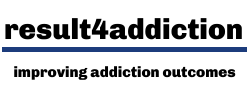Opioid treatment research
selected articles
➊ Psychosocial interventions
Psychosocial treatments for uncomplicated addiction problems are generally not substance specific. The best psychosocial interventions build in new learning to support lifestyle change.
Substitution medication provides many of the effects of opioids desired by users and the possibility of making lifestyle changes. It is easy for people to feel comfortable in a substitute prescribing programme. Moving people on requires active Counselling or Motivational Therapies.
Landmark study :: What happens to people in UK treatment services?
Gossop M, Marsden J, Stewart D and Kidd T (2003) The National Treatment Outcome Research Study (NTORS): 4–5 year follow-up results. Addiction 98: 291–303
The National Treatment Outcomes Study (NTORS) was the largest study of treatment outcomes for opiates conducted in the UK. It established the importance of structured treatments.
Attendance at residential and community (methadone) programmes was associated with reduced frequency of use of heroin, non-prescribed methadone, benzodiazepines, injecting and sharing of injecting equipment. On most measures, reductions were evident at 1 year with outcomes remaining constant at about the 1 year level or with further reductions. Crack cocaine and alcohol outcomes at 4–5 years were not significantly different from intake. The charts show the amount of time using different drugs…
Comment NTORS was a cohort study and so, strictly speaking, cannot demonstrate the effectiveness of the treatment delivered - it seems highly likely that treatment was an important factor. It appeared that agencies were focussed on opiates and did not see that their remit was to deal with other substances or to encourage abstinence. It is not so difficult to get drug free in a residential project - what matters is the quality of the preparation for going back into the real world.
Landmark study :: What is the optimal psychosocial element of a methadone programme?
McLellan TA, Arndt IO, Metzger DS, Woody GE and O'Brien CP (1993) The Effects of Psychosocial Services in Substance Abuse Treatment. JAMA 269: 1953-1959
This study investigated the addition of psychosocial treatments to methadone services. Three programmes were tested: i) minimum methadone service (MMS) — methadone alone (at least 60 mg/day ) ii) standard (SMS) added counselling iii) enhanced (EMS) added counselling, on-site medical/psychiatric, employment, and family therapy. The MMS delivered little improvement and was discontinued after 12 weeks. The EMS group showed the best results but further analysis found SMS to be optimal.
As might be expected the outcomes were better the more intensive the intervention. Note that there was continued supplementing of methadone in all groups.
➋ Pharmacotherapies
You can’t prescribe your way out of an addiction problem
Pharmacotherapy for opioid addictions tends to be dominated by substitute prescribing, which is a crucial intervention, but medications to support abstinence tend to be overlooked. 1. Prescribing alone is ineffective; 2. Best to combine a standard treatment, such as Counselling or SBNT, with a substitute prescription; 3. Naltrexone is an effective relapse prevention drug; 4. Methadone or buprenorphine are both good as maintenance medications.
Landmark study :: Are injectable heroin or methadone effective substitute medications?
Strang J, Metrebian N, Lintzeris N, Potts L, Carnwath C, Mayet S, Williams H, Zador D, Evers R, Groshkova T, Charles V, Martin A and Forzisi L (2010) Supervised injectable heroin or injectable methadone versus optimised oral methadone as treatment for chronic heroin addicts in England after persistent failure in orthodox treatment (RIOTT): a randomised trial. Lancet 375: 1885–95
This study compared the effectiveness of supervised injectable heroin (diamorphine) or injectable methadone to optimised oral methadone for long-term heroin addicts already prescribed oral methadone, but continuing to inject street heroin regularly. This study is important because it demonstrates a harm reduction option for injecting heroin addicts who do not respond to optimised oral methadone.
The charts show the proportion of participants using only prescribed drugs and those with with positive drug tests for street heroin. Toxicology and self reported use after 6 months…
Comment Heroin substitution is a treatment for specialist addiction clinics. Once on injectables it is likely that this treatment becomes a maintenance prescription and so prescribing injectables is controversial, nonetheless, it is a harm reduction intervention for people who are unable to stop injecting street drugs. Other studies have combined heroin and methadone with benefit.
More pages about addiction treatment…
Check out treatment for: alcohol, opioids, stimulants and cannabis


